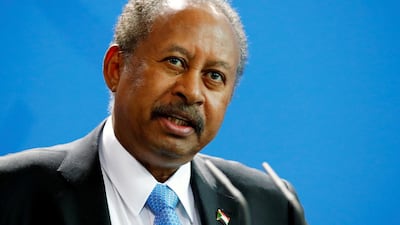Sudanese Prime Minister Abdalla Hamdok has told a senior European Union official visiting Khartoum that his country has no intention of going to war with neighbouring Ethiopia over a recent border dispute.
A dispute over agricultural land has recently spilled over into armed clashes between the two sides.
Mr Hamdok, however, warned during a meeting with Finnish Foreign Minister Pekka Haavisto that some 20 million Sudanese living on the banks of the Blue Nile would be in danger if Ethiopia made good on its threat to undertake a second filling of its massive Nile dam next summer.
Ethiopia has planned to go ahead with the megaproject regardless of whether an agreement was reached with Egypt and Sudan, which are most vulnerable to water shortages. The project is known as the Grand Ethiopian Renaissance Dam, or GERD.
Mr Haavisto arrived in Khartoum on Sunday at the head of an EU delegation to try and defuse tension between Sudan and Ethiopia over their porous border.
He was heading to the disputed border region on Monday and is due to visit Ethiopia later this week.
At the core of the tension between the two African neighbours is a move by Sudanese troops in December to wrest back control of border enclaves inside Sudan, which had long been settled by members of the powerful ethnic
Amhara group. The Amhara communities enjoy the protection of federal forces and allied Amhara militias.
Ethiopia has said it will not negotiate with Sudan unless it pulls out from the enclaves it retook. Sudan has rejected that condition and vowed to regain control of other areas still held by the Amhara farmers and militias.
“Sudan’s constant position is that it has no intention to go to war with our neighbour, Ethiopia,” Mr Hamdok was quoted as saying by state media after Sunday night’s meeting with the Finnish minister.
“The issue of the border has been decided since 1902 and all that is left is to place border post signs. Everything else can be resolved in the spirit of good neighbourliness and the ancient bonds between the two countries.”
The Sudanese Prime Minister was alluding to a 1902 agreement demarking the border between Sudan and Ethiopia, which was reaffirmed in1972.
Beside the border dispute, Sudan and its neighbour Egypt are at sharp odds with Ethiopia over the GERD.
Sudan has insisted that Ethiopia must share data on the operation of the dam to ensure that its own hydro-electric dams on the Blue Nile are not disrupted, and to avert flooding.
The alternative, Mr Hamdok told his Finnish guest, would be “disastrous.”
Ethiopia refuses to enter a legally-binding agreement on the operation of the dam, arguing that it prefers recommendations instead.
Adis Ababa is also resisting pressure to enter a legally binding deal on mechanisms governing future disputes and handling persistent droughts.
“The dam must be established on the basis of international law, which maintains the rights of every party and that no party is affected,” the Sudanese prime minister told Mr Haavisto.
Egypt, for its part, argues that the dam could significantly reduce its vital share of the Nile waters, a possibility that it views as an existential threat.












